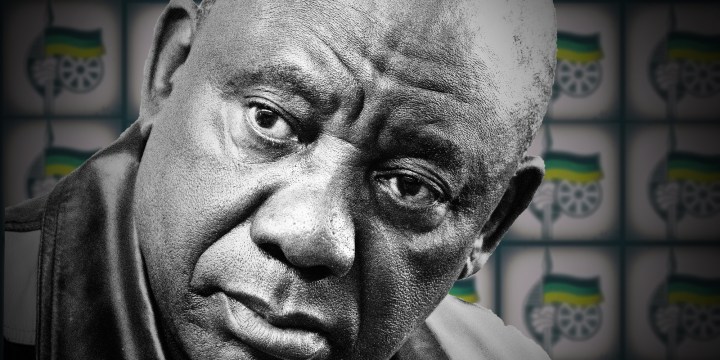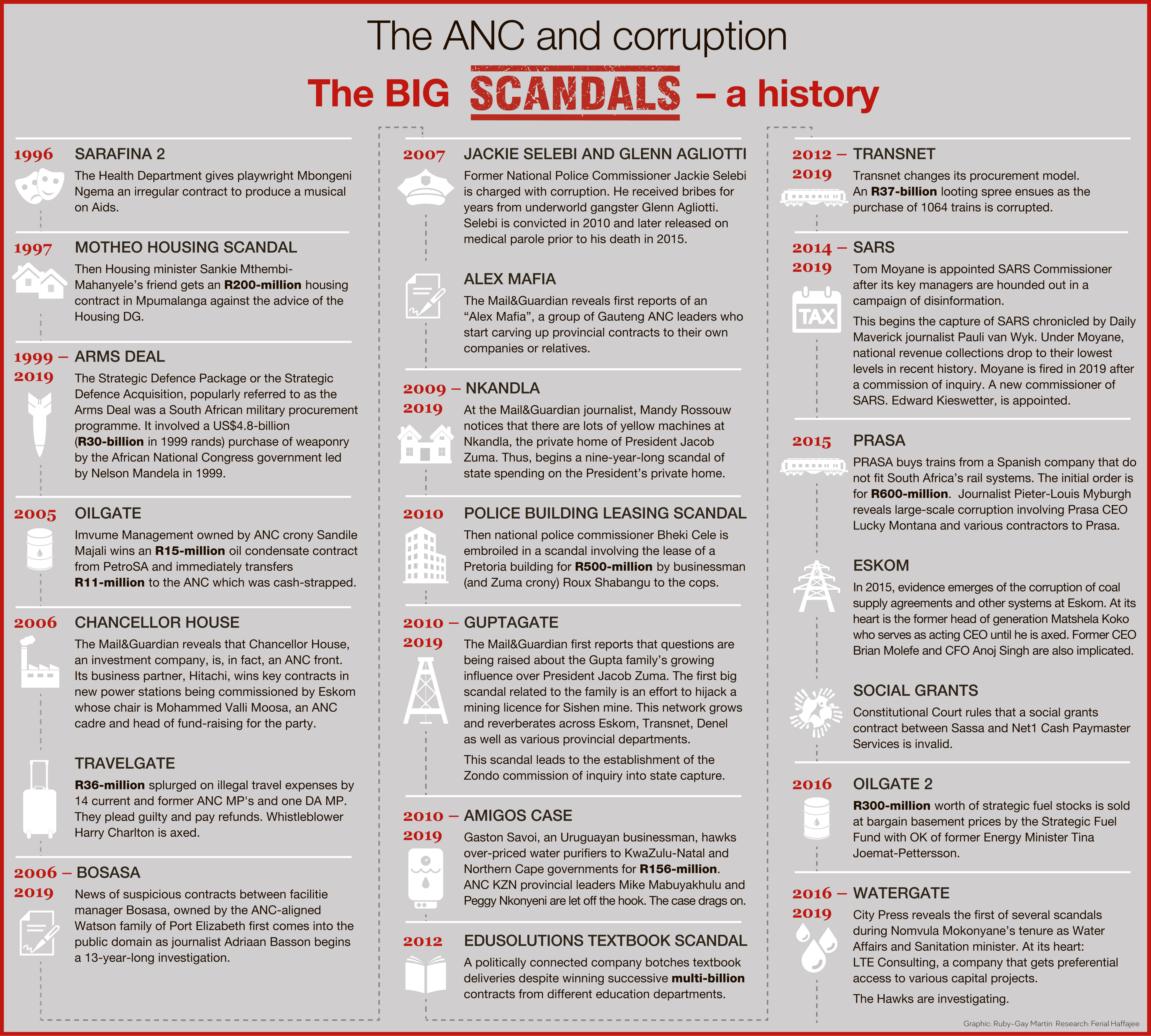SPECIAL REPORT
Corruption is eating the ANC’s soul – can Ramaphosa save it?

In 24 years, the ANC and various leaders have been mired in 21 scandals for which there has been almost zero legal or ethical accountability. Can Cyril Ramaphosa get rid of corruption networks still ripping the party apart as the fightback gains pace?
A month after the general election and the ANC is in a factional war with President Cyril Ramaphosa looking weak and indecisive in the face of a fightback campaign by the state capture networks, now organising across party lines and within institutions in the state.
A Daily Maverick special report on malfeasance in the ANC has found that the party has been repurposed by graft: from a liberation movement to a party of government, it is in many aspects today associated with patronage and corruption. The current fight between the faction led by ANC secretary-general Ace Magashule and the broader reform group led by President Cyril Ramaphosa can be explained in a single theme – whether or not the imperative to accumulate through the party can be stopped and redefined by an ethos of service.
The jury is out.

In 24 years, the ANC has come to be defined not by running a capable state or by a great leap forward in democratic government, but by scandal. This graphic shows the 21 big scandals that have taken on a national dimension. It started small: the first significant misuse of public funds Daily Maverick could find was the Sarafina 2 story of how, in 1996, the Department of Health gave playwright Mbongeni Ngema an irregular contract to produce an ill-fated follow-up to the hit musical Sarafina (called Sarafina 2) as part of a campaign against HIV infection which was then ripping through the country at a fiery pace.
A year later, in Mpumalanga, a friend of the minister of housing, Sankie Mthembi-Mhanyele, received an irregular housing contract for R200-million against the advice of the director-general of Housing at the time. In both these first cases, investigations were suppressed and whistle-blowers isolated, starting a practice that eventually allowed small-time corruption to grow into large-scale state capture.
Two years later, when the democratic era’s founding leader, Nelson Mandela, was still in the presidential office, South Africa signed an ill-fated arms deal or strategic defence package for a value of R30-billion. Arms dealers courted party leaders using politically connected middle-men to set the pattern in stone. This week’s battle in the High Court to overturn the Seriti Commission of Inquiry into the arms deal findings shows how the era of impunity started and still continues. In May, former president Jacob Zuma went to court for the umpteenth time as part of his battle to quash the arms deal case against him: that he took bribes via a proxy, Schabir Shaik.
Both these cases show that in 20 years, there has hardly been a shred of accountability for the misspending on the arms deal, the scandal that was the beginning of the end of the ANC’s moral probity.
Gates, front companies and patronage networks – corruption gets sophisticated
From then on, if you look at the graphic, the scandals related to corruption grew bigger and bigger and more definitive. They began to take on the journalistic shorthand of a “Gate” – named for Watergate, the defining investigative journalism piece in American history.
South Africa had its own Watergate under the former minister of water and sanitation, Nomvula Mokonyane, when City Press revealed the loss of at least R1-billion during her tenure to big deals with crony companies. There were two Oilgates, which related to contracts at PetroSA (in 2005 and again in 2016); there was Travelgate (2006), which involved only R36-million but which caught 14 ANC MPs (and one from the DA) who fiddled their expense claims.
An analysis of corruption under successive ANC governments shows it occurred under each administration, from Mandela to former president Thabo Mbeki and to its entrenchment as the order of business under Zuma. This shows it is now ubiquitous and occurs regardless of who leads the party.
Patronage networks honed in on resources (oil, water), infrastructure (trains, bridges, sanitation systems, power stations), access to opportunity (mining licences, government leases) and the social welfare and education systems (social grant payments, and textbook production and delivery).
Wherever there is a state revenue flow, patronage networks with political cronies have set up shop. Bosasa, run by the Watson family, is the most obvious example of how this works.
The company first had the cover blown on its work by now News24 editor-in-chief Adriaan Basson, who in 2006 first reported on how it cornered facilities contracts with the Department of Correctional Services. Earlier this year, Bosasa former COO Angelo Agrizzi blew the whistle on how the company had operated like an ANC front company, parlaying its political contacts into an extensive empire of facilities management at prisons, the asylum centre Lindela and the Airports Company of SA.
There have been other ANC front companies that won state contracts, including Chancellor House (2006), whose partner Hitachi won key contracts in the Eskom power station builds. The party’s head of fundraising, Mohammed Valli-Moosa, was also the chairperson of Eskom. Thirteen years on, Hitachi’s is one of the contracts fingered as costing billions of rand in cost overruns. Eskom’s debts are dragging on the fiscus and threaten a downgrade to junk status.
While the Gupta family patronage network is perhaps the best-known, it is also the newest. Mail&Guardian first began to report in 2010 on the family’s outsize influence over Zuma. The Zondo Commission of Inquiry into Allegations of State Capture has provided an anatomy of how Ajay Gupta, the oldest brother and patriarch, sculpted a network that started with the family attempting to hijack a mining licence at Sishen and ended with an effort to export Denel’s intellectual property to Hong Kong.
The first patronage network, only partially uncovered, was the so-called Alex Mafia, which was reported on in 2007, when ANC Gauteng leaders commandeered provincial spending to favour a system of politically-linked companies owned by young cadres who had grown up in Alexandra.
Institutional attack and capture
Daily Maverick has found that in the 21 instances of major or significant malfeasance, the revelations of the descent into corruption were made by the media and not by police investigations. Other than convictions and short jail terms for Schabir Shaik and Tony Yengeni, no ANC members have been significantly called to account or investigated or convicted for their roles in the various instances (in the Travelgate affair, MPs pleaded guilty in return for fines).
Investigations into many of the allegations were shut down at the National Prosecuting Authority, at Parliament and at the SA Police Service (including at the specialist units the Scorpions and the Hawks) almost as soon as they started. The Mokgoro Commission of Inquiry into the National Prosecuting Authority revealed some of how the institution was hollowed out but Judge Yvonne Mokgoro was only tasked to look into the tenures of former acting national director of public prosecutions Nomgcobo Jiba and former head of the Special Commercial Crimes Unit Lawrence Mrwebi.
The bribery case involving South Africa’s first black democratic-era police commissioner, Jackie Selebi, and the mafioso Glenn Agliotti in 2007 shed light on another trend: how patronage or mafia networks courted contacts within the police service to slow down or drop investigations. This pattern has now been entrenched, as current National Director of Public Prosecutions, Shamila Batohi has found.
The SA Revenue Service (SARS) attempted to take up the slack by trying to take out the networks through tax investigations and prosecutions, but it came under attack between 2014 and 2019 too and was captured, as the Nugent Commission of Inquiry has detailed and Daily Maverick’s Pauli van Wyk has found.
Can Ramaphosa take out corruption in the ANC?
At the World Economic Forum in Davos, Switzerland this year, Ramaphosa said: “The positive thing is, while the truth comes out, it is adding to our resolve as a country and as a government and as a people to fight corruption, to bring it to an end and to make sure that those who have been complicit in acts of corruption are brought to book.”
At the launch of the party’s manifesto in Durban in January, he said that those who were found guilty of corruption and state capture would not be allowed to serve in positions of authority, whether in government, parliament or within the party itself.
Ramaphosa is trying both at the level of message and action. He has instituted four judicial commissions of inquiry into various aspects of state capture and institutional decline; he has put Batohi into place and has signed a proclamation to create an investigating directorate now led by Advocate Hermione Cronje. Jiba and Mrwebi are footnotes to history. So is former SARS commissioner Tom Moyane, who has been replaced by Edward Kieswetter.
Former social development minister Bathabile Dlamini’s vituperative resignation letter on Tuesday, 11 June, is a sign of weakness not of strength, and the ANC characters who defined the era of state capture have either been consigned to bit parts of political life or are quickly taking pensions. Yet, Ramaphosa is facing a ferocious fightback against his campaign against corruption.
Mapping the fightback
The cartography of the fightback map is ever-growing. There is no doubt now that the ANC headquarters at Luthuli House is one of the staging posts. In the past week, secretary-general Ace Magashule has taken off the gloves. Somebody (it is not clear who) is fighting back, with the announcement on Tuesday that Magashule will face a formal inquiry led by former president and ANC secretary-general Kgalema Motlanthe into whether or not he plotted with the African Transformation Movement party of MP Vuyo Zungula and late-joiner Mzwanele Manyi to make it a spoiler front.
It got just 76,000 votes (or 0.44% of the total) in last month’s election but the head of the SA Council of Messianic Churches in Christ Buyisile Ngqulwana has claimed in court papers that Magashule was part of the planning team, according to revelations in the Sunday Times. Members of the ANC are allied with parts of the EFF, which is often the voice of the anti-Ramaphosa fightback, notably in the campaigns against public enterprises minister Pravin Gordhan and the SA Reserve Bank. And, in certain investigations, it is clear that the public protector is allied with these forces too as her findings on Gordhan and the Bank have shown. Sources say that remnant elements of capture within SARS are also part.
Can Ramaphosa take out the corruption in the ANC?
“I think that Cyril Ramaphosa has done pretty well since he came into office 16 months ago. But like many, I am concerned about how slowly he is moving in relation to the ANC,” says David Lewis, director of Corruption Watch. “You have to tackle high profile people, you must demonstrate strength.” He said he thought that rather than use the Integrity Commission, it would be better to use the disciplinary codes of the governing party to tackle errant members. DM



















 Become an Insider
Become an Insider